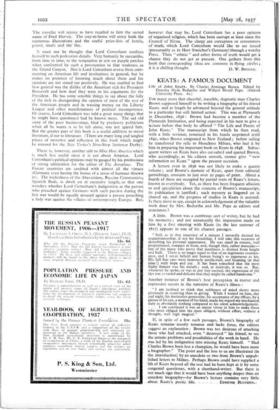KEATS : A FAMOUS DOCUMENT
Life of John Keats. By Charles Armitage Brown. Edited by Dorothy Hyde Bodurtha and Willard Bissell Pope. (Oxford University Press. 6s.)
FOR many years that cheerful, irascible, dogmatic man Charles Brown supposed himself to be writing a biography of his friend Keats, and at length he advanced beyond the general attitude to a particular but still limited action. This was at Plymouth in December, 1836: Brown had become a member of the Plymouth Institution, and being expected in his turn to give a lecture before that body he offered "The Life and Poems of John Keats." The manuscript from which he then read, with a little revision, remained in his hands unprinted until 1841, when Brown emigrated to New Zealand ; before sailing he transferred the relic to Monckton Milnes, who had it by him in preparing his important book on Keats in 1848. Subse- quent writers on Keats have also consulted and quoted Brown, who accordingly, as his editors remark, cannot give "new
information on Keats" upon the present occasion.
A lecture even in 1836 was not likely to make a quarto volume ; and Brown's memoir of Keats, apart from editorial garnishings, amounts to just over so pages of print. About a fourth of these are occupied by partial texts of Keats's letters, known to everybody. Yet, as there has been frequent allusion_ to and speculation about the contents of Brown's manuscript, its publication is justified ; such mystery as lingered on is cleared up, and the progress of studies in Keats is assisted. Is there more to say, except in acknowledgement of the valuable work done by Mrs. Bodurtha and Mr. Pope as editors and annotators ?
A little. Brown was a cumbrous sort of writer, but he had his moments ; and not unnaturally the impression made on him by a first meeting with Keats (in the late summer of r817) appears in one of his clearest passages.
"Still, as in that interview of a minute I inwardly desired his acquaintanceship, if not his friendship, I will take this occasion of describing his personal appearance. He was small in stature well proportioned, compact in form, and, though thin, rather muscular— one of the many who prove that manliness is distinct from height and bulk. There is no magic equal to that of an ingenuous counten- ance' and I never beheld any human being's so ingenuous as his. His full fine eyes were lustrously intellectual, and beaming (at that time !) with hope and joy. It has been remarked that the most faulty feature was his mouth ; and, at intervals, it was so. But, whenever he spoke, or was in any way excited, the expression of the lips was so varied and delicate that they might be called handsome."
Another instance of Brown's best perception in matter and expression occurs in the narrative of Keats's illness :
"I am inclined to think that nobleness of mind shows more gloriously in receiving than in giving. While I waited on him, day and night, his instinctive generosity, his acceptance of my offices, by a glance of his eye, a motion of his hand, made me regard my mechanical duty as absolutely nothing compared to his silent acknowledgement. . . . I am convinced it was an innate virtue in him to make those who most obliged him the most obliged, without effort, without a thought, well nigh magical."
If, in spite of a few such passages, Brown's biography of Keats remains-- mostly .tenueus and' lacks force, the editors suggest an explanation : Brown was too desirous of attacking
those who had attacked, even " destroyed " his friend, to see the artistic problems and possibilities of the work in hand. He ,was led by his indignation into missing Keats himself. "Had
.Charles Brown been less a champion, he Would have been more a biographer." The point and the loss to us are illustrated (in the introduction) by an anecdote or two from .Brown's unpub- lished letters to Milnes. Perhaps Brown could have supplied a -life of Keats beyond-all the rest had he been kept at it by some congenial questioner, with a shorthand-writer. But there is
not much sign that it would have been anything deeper than an .anecdote biography—for Brown's lecture contains very little






































 Previous page
Previous page